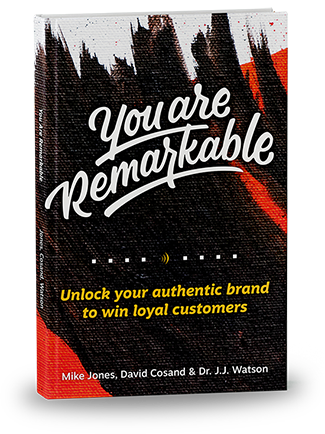As we all know, there’s more than one way to get your firm’s brand out into the world. Traditional content strategy with a website, ad campaigns, articles, social media, and a skillfully edited brand video is increasingly common—and not necessarily ineffective. If it’s done well and authentically, not by a long shot.
Trust me, you don’t have to go super-outlandish with free air guitars or pregnancy test coupons in magazines to get your brand seen.
As I wrote about last month, short videos are probably the most potent, shareable way to capture your brand anthem and communicate it with a wider audience. Video taps two of the five senses, taps memory and emotion, and speaks the common parlance of phones, tablets, and computer screens that take up people’s time.
But even if you’re dropping money on filming or professional editing, there’s one final strategy you should not overlook.
Writing (and, of course, publishing) your brand anthem in a book.
A brand book, or perhaps a book containing your collected thoughts on a relevant business or marketing topic, gets people excited—especially in professional services.
Think of a brand book as a printed, sophisticated piece of thought leadership: a respectable piece of developed, long-form content that contains your brand anthem and even raises it to a higher level of conversation.
But writing a book raises pointed questions, with the first one being:
How do I get there?
How do I get my brand anthem into an actual book someone can hold in their hands?
Do I have to write?
What about editing and publishing—aren’t those lengthy journeys in and of themselves?
Great questions.
But before I dive in, let me recap what any brand or topical book should be doubling down on: brand anthem.
If you want to do something right, there’s no getting enough of the basics.
Brand Anthem
If your brand anthem is the starting point—your north star for a killer video, slick visuals and marketing, or even a product rollout—you should know exactly what it is and why it resonates with people.
Lest we forget, a good brand anthem builds on elements of a good story (one about your clients, and how you help them) and waves them into a clear, vibrant banner. I walked through the elements of a brand anthem in detail, but they’re worth repeating—there’s the hero (your client), the problem they’re facing, the guide (that’s YOU), and then the solution. As you can probably imagine, the story goes like this: the hero had a problem, and with the help of a trusting, knowledgeable guide, the hero solved that problem.
That story, of course, contains your brand’s unique traits and values. If it’s uniquely you—and don’t forget, whether you’re an accounting firm or a law firm or an engineering firm, you’re still the guide—then your brand anthem should set you apart from the stories that other brands are telling… in a pretty big way.
How do you uniquely help the hero?
Which kind of hero (or better yet, which problem) are you focused on solving?
How do you uniquely solve it?
With what philosophy or fresh vision of a better world? How is your solution different from other brands?
If your brand story sounds a little too familiar… then it might be time to tease it out a little more. Getting your brand anthem clear, and polished, and getting your message about who you are on point means carving out your position in the marketplace.
What’s your approach to the hero’s problem?
What’s your unique solution? Your answer for a segment of the market that’s not being fully served?
Potent brand anthems are usually the focused ones… and if we’re talking about writing a book on it, the more potent, the better.
Starting the Book Process
Say you’ve got all that—a brand anthem with a tight, well-messaged story, and maybe even a tagline to go with it. Say you’re developing that brand anthem with your website. Maybe you’ve started to write some blog posts that break it down for everyone.
Great.
If you’re there, or getting close to that state, you’re well on your way to building out the thoughtful brand book I mentioned earlier.
If polishing up your brand anthem is step one of the process, then writing, publishing, and promoting the book is step two.
I mention blog posts as part of step one because, for many brands, they’re an incredibly helpful content strategy… and at the same time, a helpful, preemptive, book writing hack.
But here’s a better one.
Trick Your Leadership Into Writing a Book
I mean it… but not literally.
If you walk away thinking you can convince some ghostwriter that they’re really cranking out Mark Cuban or Elon Musk’s next business book (and for a hefty fee when the draft is done), please think again.
I’m talking about writing your book with other people’s input, and with a content strategy that lends itself toward developing a thoughtful, in-depth book over the course of a year, even while you’re pressing out monthly, brand anthem-grade content.
It’s no one size fits all… but it is a strategy worth considering.
Typically, it won’t be just you writing the book; it’s a process that will involve the partners and leadership of your firm. So give yourself plenty of time.
Start out by carving out twelve months (not five, not three) and making a calendar of topic questions. By topics, I mean every content angle, area, or conclusion you’d like your book to cover.
A twelve month content strategy calendar is necessary because the next step is involving the key brain power behind your brand… although if that brain power involves thirty or more people, you may not get to all of them.
Once you’ve got the brain power lined up, ask the tough question—who’s going to spearhead this? Will your book have one, or two, or even three authors? Assuming those potential authors have other full-time responsibilities, families, and a generally busy life (and assuming you’ve got one partner willing to step out with you and take the lead), how are you going to get them to dump out all that knowledge and experience they have?
How about one drip at a time, through conversation?
Generating enough content over twelve months that can be turned into a book is not easy. But one way you can get your partners to commit to is by planning time for you and them to sit, hit the record button, and talk about the things that need to go into the book.
That calendar, and those conversations give you plenty of material to work with, both for your book and for the monthly social media, audio, or even visual content that you want to be dripping out.
And that’s what I mean when I say trick your leadership into writing a book.
Speaking from Experience
I’ve found that this works for one key reason—those people who are knowledgeable, experienced, and interested in being authors of a book are usually verbal.
Think about it.
They’re used to talking to clients all day. They’re used to having to sell and pitch the business with their mouths, with speech, communication, and facial expression. Getting them in front of a microphone is one of the best ways to get the content out of their heads and eventually into a manuscript page, paper or digital.
I’ve also found that getting those key people involved in planning that outline pays dividends. For one thing, if your co-authors understand the strategy, you’ll get buy-in right from the beginning.
Who knows?
By tapping your firm’s brain power as co-authors, you might also be tapping them as podcast hosts for twelve podcasts at the exact same time. One podcast episode a month can follow, and fill out a chapter in the book.
Or not.
Keep in mind that your conversational writing sessions don’t need to be a podcast. If you’ve got a twelve month, one year content strategy set, then you and your co-author don’t need to pull out some fancy, expensive microphone when topic one rolls around.
If it takes some pressure off, use your iPhone. Or, and with the high probability that you’re both working remotely, hop on Zoom for an hour. Just say ‘we’ll record it and we’ll see what happens.’ As long as you’re able to get their voices recorded, you’ve got content you can start to utilize—and pull from if you need quotes or soundbites for brand marketing.
With a twelve month content calendar, and a commitment from co-authors to sit down and record twelve conversations, you can’t go wrong.
Book Strategy is Content Strategy
Having built that twelve-month calendar, you might be outlining your book and deciding on its structure at the same time. Simply enough, each month’s topic is a different chapter of your book.
Chances are, you’ll be building off your brand anthem—unless, of course, everyone at your firm just happens to have a Ph.D. in the same, unrelated subject and wants to write about it. But more likely, you’ll be drawing closely from your brand anthem with whatever topic you tackle.
With that in mind, you can generate an outline from your brand anthem and pencil them in quite easily. If you just did a chapter on your hero, well, next up is your hero’s problem. If you just did a chapter on the guide, then move on to your unique solution and how that unlocks a new level for the hero. Next up? The outcome…
And so on.
Or mix things up a bit.
However you slice it, twelve months should give you twelve themes for you and your partners to talk about… and twelve fresh podcasts, (or if you’d rather not publish them as podcasts, interviews…) Or twelve wells of thoughtful, quotable content, perfect for blog articles, email newsletters, social media, or mini-marketing concepts. All for each month of the calendar year.
How’s that for a book writing hack?
But Why a Book?
I want to peek behind the curtain of your future here.
Assume you’ve sharpened up your brand anthem.
Imagine that you’ve interviewed twelve knowledgeable people, (or even, three co-authors four times each).
Take one more leap and imagine you’ve published it.
Why have you published it?
Believe it or not, and unless you’re extremely lucky or super well-connected in the New York City publishing world, you didn’t necessarily publish the book to sell millions of copies… enough for an advance on the next book and a ranch in Montana.
In fact, you probably didn’t even publish it to sell thousands.
Bear with me: you published your book to establish your firm, build your credibility, and show people why you’re unique beyond any shadow of a doubt. If you think about it, those co-authors you brought on board are probably among the foremost leaders of the unique way you approach and do business. By mining their experience and expertise, and by writing it up and publishing it in a book, you’ve distilled their unique view, their philosophy, and their way of serving clients into a satisfying, readable product.
That speaks volumes about your firm, and even reminds people that your firm truly is remarkable.
I’m not saying that the book isn’t a product in and of itself (of course it is, even if you’ve given away much of the content for free in monthly blog posts or podcasts)… but it’s not the overarching fruit of your intention.
Of course there are strategies to recoup the cost of writing, editing, publishing, and promoting it… but think of those benefits as incidental to the real value: establishing deep credibility for your brand.
Writing a Book Makes It Official
In a way, it really does.
The effort, time, planning, knowledge, and elbow grease that goes into a published, thought-leading product often speaks for itself. Hand someone a book and you’re a lot more likely to get invited on their podcast, or to give a lecture at a conference coming up…or win the contract with a new, big client.
That’s because a brand book shows people your unique, remarkable process, and what it looks like crossing the finish line.
Now THAT’s a business card.
What a way to tell, and show, and, insofar as you get some readers, continue telling them about your unique process, your unique solution to the hero’s problem, and your one-of-a-kind position in the marketplace.
Going around and saying you have a unique position unfortunately, means nothing.
But having written and published a book about it usually means you’ve lived it. It means you know that position from every angle, and furthermore than you’ve owned it through experience.
All this to say, a book isn’t the only way of telling people that you’re remarkable.
I’ll probably talk more about publishing in another article, but a book lends itself to a number of mediums. As part of the publishing process, there’s plenty of room to branch into an audio version, an e-reader or digital copy people can share or download… or like I mentioned earlier, a sign leading back to those twelve months of blogs or podcasts.
Adding a book to twelve months of existing content is in many ways, a force multiplier.
Need Help Planning a Brand Book?
You’ve come to the right place.
Having planned and written a book on B2B branding with some pretty amazing people, I can tell you all about the ins and outs of gathering audio content, getting it into words, and organizing those words into a publishable, potent, brand anthem product.
It’s no cakewalk, but I believe it’s worth it.
If you think planning a book would be a worthwhile part of your brand’s content strategy, and if you’d like some help or consultation with that, the Resound team stands ready. Give us a shout.
You can even check out my book ‘You are Remarkable’ on Amazon to get a sense of what I’m all about, and why I love helping brands and companies share their story with the world.
So dream big.
And don’t forget that you are remarkable.



